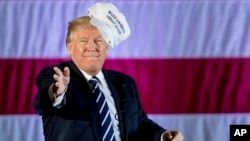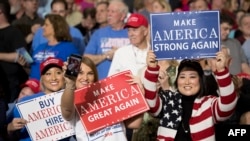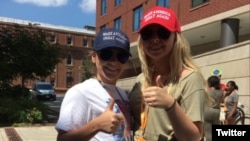Make America Trump Free Again Hat
Daryl Davis, a black musician who has fabricated a exercise of befriending members of the Ku Klux Klan, says he knows exactly what racists hear in the slogan "Make America Great Again."
Donald Trump "won the election on one word, one word only. And that word was 'again,' " Davis says.
"When was 'again?' " Davis asked during an interview at his habitation in May, discussing race relations in the age of President Trump. "Was information technology dorsum when I was drinking from a split up h2o fountain? Was information technology when I couldn't swallow in that restaurant over there? ... Make America Groovy Again -- before I had equality?"
Trump told The Washington Post he thought of the slogan in 2012 and trademarked it immediately, although similar words accept been used by politicians equally far back as President Ronald Reagan.
President Bill Clinton is on record equally having used it during his presidential entrada in 1991, although not as an official slogan. Yet, in 2008, while campaigning for his wife, he noted: "If you're a white Southerner, y'all know exactly what it means, don't you?"
Is it possible that Trump was elected to the presidency with a racially charged slogan? Or are supporters and critics but hearing what they want to hear?
Christian Picciolini, a one-time neo-Nazi who now works to assistance other white supremacists leave the motility, says the slogan fits into the alt-correct's efforts to make its message more attractive by toning downward the rhetoric.
"That was a concerted effort," Picciolini says in an informational video for Vocalization news. "Nosotros knew we were turning more than people away that we could somewhen have on our side if we just softened the message. These days with our political climate nosotros see a lot of coded language, or dog whistles." (Picciolini's utilize of "domestic dog whistle" refers to a subtle bulletin meant to be understood but past a particular group of people, similar a whistle pitched high enough that a dog might hear it, simply a human would not.)
"Brand America Great Again?" Picciolini asks rhetorically. "Well, to them, that ways make America white once again."
In June 2016, a Tennessee politician even put that on a billboard. Rick Tyler, running for a congressional seat in more often than not white Polk County, Tennessee, explained that his "Make America White Again" billboard was meant to evoke the mood of 1950s America, when television shows idealized the image of the happy white family.
In a Facebook post, Tyler said, "It was an America where doors were left unlocked, violent offense was a mere fraction of today's charge per unit of occurrence, there were no machine jackings, abode invasions, Islamic Mosques or radical Jihadist sleeper cells."
Tyler's billboard quickly drew negative national attending and was taken down inside a few days.
Ameliorate economical times
President Trump says he only meant the slogan to refer to ameliorate economic times.
"I felt that jobs were hurting," Trump told the Postal service in January. "I looked at the many types of disease our country had, and whether information technology's at the border, whether it's security, whether it'southward police force and lodge or lack of law and order."
Trump said the slogan "inspired me, because to me, it meant jobs. Information technology meant industry. And it meant military strength. It meant taking care of our veterans. Information technology meant and so much."
David Axelrod, primary political strategist for former president Barack Obama, credits Trump with understanding his audience and crafting a message whose flexibility was role of its appeal.
Trump, Axelrod told the Postal service, "understood the market that he was trying to reach. You tin't deny him that." He added, "In terms of galvanizing the marketplace that he was talking to, he did information technology single-mindedly and ingeniously."
So who is Trump'south market? Co-ordinate to surveys, at its core are white men in the blue-collar sector -- the demographic with the well-nigh to lose when women and minorities started gaining more rights and earning power over the past few decades. Merely people who discover hope in "Make America Swell Again" come from more just that narrow category.
Jason Rankin, a existent estate amanuensis in Knoxville, Tennessee, described his thoughts about the slogan this way: "Making America Great Once again to me ways at least the following things: less national debt, more secure borders, more freedom of voice communication, more gun rights, more job opportunities across the land (merely especially in rural areas), college GDP, stronger national security & a stronger military, more than coin in every American's banking concern account."
Tony Goicochea, an audio engineer in Washington, D.C., said Make America Keen Again "has a vision to it," as well every bit a reference that, to him, speaks of greater economic prosperity in the past, and fiscal lives unburdened by crippling debt.
Growing upwardly in the 1980s, Goicochea said, "I saw people go to higher, they graduated, and they got a task. That was it. They were able to motility out on their own and start a life for themselves. So I call up about our economics, how much better our economics were."
Now, Goicochea noted, American families are experiencing a boomerang syndrome -- recent graduates who take moved dorsum in with their parents because they cannot make enough money to back up themselves and pay off college debt.
Shannon Crannick, a retail consultant in Festus, Missouri, says she believes making America groovy again means "putting an end to all the hate that has come around in the last few years. Making it safe to walk down the street once more. Less debt, secure borders, more support for the armed forces, freedom of speech coming back, better help for the poor and people loving each other again."
Better for whom?
In a Washington Post/ABC News poll taken in September 2016, three-quarters of self-identified Trump supporters said America's greatest days are in the past.
When the same question was asked of other demographic groups, all the same, five out of six African-Americans disagreed.
The polltakers concluded that i'south estimation of the country's greatness depends on factors such as gender, race and education level -- the kinds of factors that have a direct touch on income and political representation.
Hence, "Brand America Groovy Again," doesn't just appeal to people who hear information technology as racist coded language, but likewise those who have felt a loss of status as other groups have become more empowered.
Marketing consultant Eva Van Brunt, a critic of the president, says the malleability of the words "great" and "again" are a mutual marketing trick: using words that sound positive, just lack specific pregnant.
"By leaving a definitional vacuum around the word 'great,' it became very easy for groups to co-opt it, ascribing to it the meaning they wanted it to have," Van Burden says. "The aforementioned way a mother rests easy because her baby's food has 'all-natural' written on the jar, Nazis, the KKK, and other white supremacists were able to feel expert about Trump considering 'cracking' became interchangeable with white, heterosexual, male, hate, oppress, deport.
As for the word "again," VanBrunt notes that it limits the audience to those who call up America was once great and no longer is.
"That excludes those who never thought America was swell for them and those who think America is smashing for them now," she says. "Looked at from that vantage point, it's hard to imagine that the co-opting by certain groups was adventitious."
Different interpretations
For improve or worse, the phrase is a loaded 1, with potential to cause problem betwixt people who practise not share the same estimation.
On August 19 at Howard Academy in Washington, D.C., two white teenage girls on a summer enrichment trip entered a campus cafeteria while wearing "Brand America Peachy Once again" trucker hats that they had recently bought at a suburban mall.
The girls, part of a grouping of students from Union City High School in Pennsylvania, say they were unaware Howard was an historically black university.
"I don't even think our advisers really knew," 16-year-old Allie Vandee, ane of the chapeau-wearers, told Buzzfeed. "We but thought of Howard University, nosotros know it's celebrated, so nosotros kinda went," she said.
Howard University students who witnessed the event say students chastised the teenage visitors for wearing the slogan. 1 walked upwardly and snatched at their hats. Another i cursed at them. The teenage girls left the cafeteria and shared their experience on Twitter. They say they were unfairly harassed.
The incident prompted discussions online and on campus at Howard. It has resulted in no major protests, turf wars or Twitter feuds. But it was an indicator of deeply different interpretations of that particular 4-give-and-take phrase.
Student Merdie Nzanga, a junior at Howard, was in the cafeteria when the teenagers walked in. She said several of her friends confronted the teenagers for being insensitive.
"I didn't say annihilation," she told Buzzfeed. But, "to myself, I thought, 'This is going to be trouble.'"
Source: https://www.voanews.com/a/is-make-america-great-racist/4009714.html




0 Response to "Make America Trump Free Again Hat"
Postar um comentário